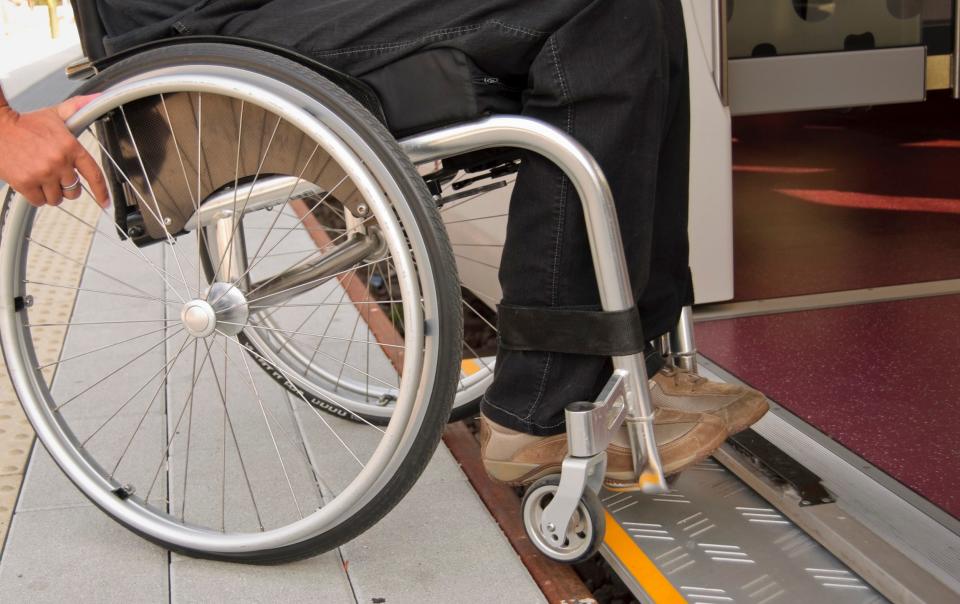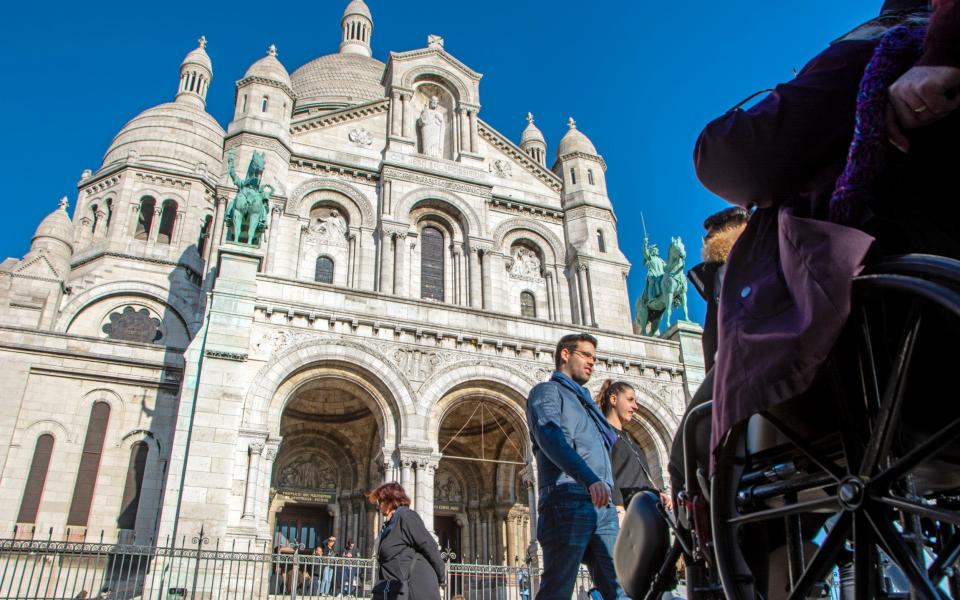Many of the events at this summer’s Olympic and Paralympic Games in Paris will take place at existing monuments, including the Invalides complex on the Left Bank, which was built under the reign of Louis also kept separate. of the rest of the population. The mentality the name represents should be a relic of the past, but as the Games draw closer, some argue the city still has a way to go in its marathon toward inclusivity.
When Paris declared its candidacy for the Games in 2017, the city unveiled its plan for a “sports-driven journey towards a society where no one is left behind.” The Games would be used as an opportunity to improve the capital’s historically poor accessibility for disabled people.
Organizers expect around 350,000 visitors with disabilities to attend this summer, and thanks in part to pop-up locations and temporary infrastructure such as shuttle buses, all locations are reportedly accessible, at least in terms of physical infrastructure.

However, some campaigners worry about the legacy after the Games. Nicolas Mérille is National Advisor on Universal Accessibility at leading charity APF France Handicap [the word “handicapé” is still used in France to mean disabled]. “In preparation for the Olympic and Paralympic Games, there has been a concerted effort that must be recognized, but these measures will only last for the duration of the Games,” he said.
Around 1,000 accessible taxis have been added to the city’s 250 offering, some of which are repurposed London taxis. Over a three-year period, more than 1,750 bus stops have been renovated, so that all but two of the more than 60 routes that cross Paris are now step-free. Buses themselves have ramps that the driver must use on request.
However, Mérille still believes the French capital is falling short compared to London in 2012, citing the proportion of metro stations with step-free access in London – 18 percent at the time of the London Olympics and around a third now – compared to the equivalent figure in Paris, which APF estimates at just 3 percent.
Christophe Decloux, head of Visit Paris Region, emphasizes that accessibility for people with specific needs – including those who are pregnant, the elderly, traveling with strollers, etc., as well as people with disabilities – is a top priority. “Since 2016, we have put a lot of effort into making this destination more accessible and have a team dedicated to accessibility,” he says.
The new self-driving metro line 14 will connect the Olympic Village site in the northern suburb of Saint-Denis with the city center and is the only line fully accessible to people with reduced mobility. Across the wider network, lines 1, 4 and 14 have audible announcements to assist people with visual impairments, while lines 1,2, 3 and 13 visually show where the metro stops for people with hearing impairments.


According to Decloux, the metro is inherently limited due to the density of Paris and the historic hollowed out quarries beneath the city. “Everyone is working to make Paris accessible to everyone – but today all the metro stations that were adaptable have already been adapted: it is not a lack of ambition or will.”
Annette Masson, president of the non-profit organization Tourisme et Handicap, which aims to help professionals in the tourism sector make their offers accessible to everyone, describes a lack of awareness and sometimes attention among the general population. “Bus stops are accessible, but drivers park their cars in the bus stops,” she says.
Legislation already exists that codifies the accessibility of public sites. A first bill was passed in 1975 and followed in 2002 and then in 2005, when the French state passed the bill “for equal rights and opportunities, participation and citizenship of people with disabilities”.
For many who work in this space, the blockage is the gap between the word of the law and the practice of implementation. Masson suggests that more education among the general population is needed, as well as more sanctions from the government for when people don’t respect the rules.
It is an assessment that Nicolas Mérille agrees with, and he goes further by accusing the state of failing disabled people by not sufficiently enforcing the laws. While all new buildings must comply with regulations, there is significant leniency for existing structures. “The laws are still not being enforced,” says Mérille, adding: “We have laws, but we are letting them die a slow death.”


When it comes to hotels and restaurants, Masson also sees an education gap. “Often [hotel and restaurant owners] think only about adding the amenities, not the experience of using them. For example, maybe they add a shower seat, but not in the right place,” she says.
In 2023, President Macron announced a €300 million fund to finance accessible renovations for smaller businesses, initially prioritizing areas hosting Olympic events. But campaigners like Mérille claim not enough has been done to advertise this opportunity.
Tourisme et Handicap also aims to make tourism providers aware of the full spectrum of access needs, and not just limited mobility. The organization works with the French tourism authority Atout France and has developed a verification and certification system for hotels, restaurants and other attractions.
While accessibility for both locals and visitors in Paris may still have a long way to go, there is reason for optimism (see below). At the Aquatics Center in Saint-Denis, the only facility built entirely specifically for the Games, accessibility credentials are said to be excellent. The homes built for the nearby Athletes Village are also accessible and will become part of the local housing stock after the events. “We hope that these Games will cause an electric shock to French society,” says Mérille.
Essentials
For more information visit:
Accesslibre (Atout France; the French tourist board)
Visiting Paris with a disability (Paris Tourist Office)
Inclusivity and accessibility at the Games (Paris Tourist Office)
The torch relay of the Paralympic Games
‘A little planning goes a long way’: what it’s like to visit Paris as a wheelchair user
By Lucy Webster


Paris, like all ancient European cities, isn’t necessarily the most accessible place you can think of for a holiday on wheels, or even to host the Paralympic Games. But in my experience, a little planning goes a long way and exploring the city is much easier than it seems at first glance. I’ve been to Paris several times, with both a manual and electric wheelchair, and I’ve always managed to see, do and, most importantly, eat everything I wanted.
As in other cities such as London and New York, the subway is pretty much a no-go zone, with the exception of the new fully accessible line 14. There are other accessible subway stations on various lines, but I didn’t think this was it was the case. worth the stress of navigating the system when I was only in town for a long weekend. A real frustration was how difficult it was, especially compared to London, to find an accessible taxi; they had to be booked in advance, otherwise they would have to wait a long time. I was therefore pleased to hear about the planned expansion of 1,000 accessible taxis, of which only 250 will be available in 2022. It is a shame that the city has not taken the opportunity and perhaps the pressure of the Paralympic Games to further improve public transport. system.
But for me, the lack of accessible transport mattered less in Paris than in London, because of the French capital’s striking access gain: how easy it is to walk or roll between the main sights or simply around the city’s beautiful streets . This way you see much more of a place and create more excuses to sample pastries along the way. I like cities where I don’t have to worry about getting from A to B, and Paris’s compact center and well-placed dropped curbs make sightseeing easy.
The sights themselves are very accessible and almost all have discount cards for disabled people and an attendant. The elevator to the Louvre pyramid is an experience in itself, and on both occasions I have been to the Mona Lisa. A friendly guard helped me move forward so I could see clearly. Keep in mind that even if there is an elevator right next to a staircase in the vast palace, it doesn’t necessarily mean they’ll end up in the same place! But it really feels like everything has been done at the main tourist attractions – I was pleased to discover there was a lift to bypass the rather intimidating spiral staircase at Sainte-Chapelle, which is well worth a visit. Often you can even skip the line.
Museums are also great places to use the toilet because, like in London, even barrier-free restaurants and bars don’t necessarily have accessible toilets. As always, I had to pee and drink strategically. Accessible hotel rooms are also difficult to find; Although major hotel chains do have them, we had to give up hope of staying in a charming Parisian B&B. Fortunately, we were hardly in the hotel, so we chose convenience over atmosphere and stayed in the centrally located Novotel Les Halles. The access isn’t perfect, it never is, but rolling along the Seine in the sun is still wonderful.